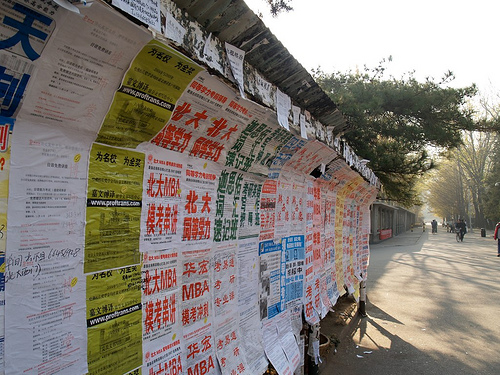Getting a job at one of China’s key state-owned enterprises (SOEs) used to come with the added bonus of Beijing residency. Not anymore.
The Beijing News (新京报) reported today that new regulations issued by Ministry of Human Resources and Social Security placed age restrictions on graduates eligible for household residency (户籍) in the capital. For example, only masters graduates born after 31 December 1988 would qualify. All those born after that date, including those already interning at their designated SOE, would no longer be eligible for residency, and the tripartite employment agreement signed by the student, the university and the enterprise would be voided.
More than 1,000 students, including some at Beijing University and Tsinghua University, are said to be affected by the policy change. The Beijing News cited the example of Xiao Zhong, a graduate student at the China Mining University interning at the Aviation Industry Corporation of China (AVIC), who was told that because he was born on 25 December 1988, a week before the cut-off date, he would no longer be eligible for Beijing residency.
Following the uproar created by the policy change, some SOEs reportedly relaxed the restrictions and agreed to let some students born in 1988 obtain residency in the capital.

Beijing University notice board. Chengphoto@flickr.com
The new restrictions on household residency are part of a long standing campaign by the Beijing authorities to control the capital’s rapidly growing population, which currently stands at around 21 million. According to official figures, at the end of 2013, there were 21.2 million permanent residents in the city, of which just over eight million were registered migrants. There are in addition several million more temporary or unregistered residents.
Up until now, the focus of the Beijing authorities’ population control campaign has been rural migrant workers. It is virtually impossible for migrant workers to obtain a Beijing household residency, and district governments have made it increasingly difficult for their children to get a place in school or gain access to any kind of welfare benefits.
Now, the authorities are placing restrictions on even the most privileged. The difference is, of course, that students from the top universities in Beijing have more resources, more access to the mainstream media, and a greater ability to get the policy changed.
